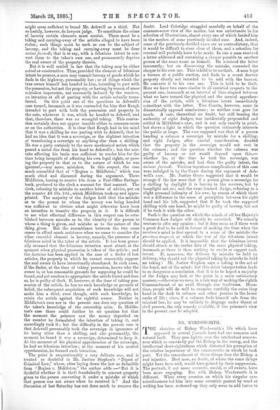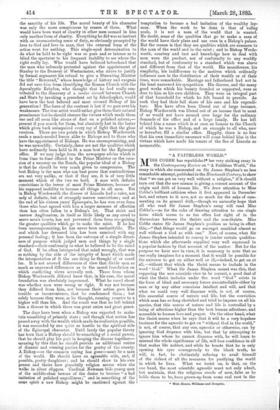DR. WORDSWORTH.
E sketches of Bishop Wordsworth's life which have
appeared in several journals have had one common and natural fault. They pass lightly over the intellectual narrowness which so constantly put the Bishop in the wrong, and the intellectual short-sightedness which distorted his perception of the relative importance of the controversies in which he took part. Yet the concealment of these things does the Bishop a real injustice. Most men, no doubt, of whom the same things might have been said, would have gained by their suppression. The portrait, if not more accurate, would, at all events, have been more engaging. But with Bishop Wordsworth it is different. When every occasion on which his singular conscientiousness led him into some eccentric protest by word or' writing has been reckoned-up they only seem to add lustre to
the sanctity of his life. The moral beauty of his character was only the more conspicuous by reason of them. What would have been want of charity in other men seemed in him only another form of charity. Everything he did was so instinct with an overmastering sense of duty, so obviously prompted by love to God and love to man, that the external form of the action went for nothing. This single-eyed determination to do what he held to be right was so pure and so intense as to blind the spectator to his frequent inability to see where the right really lay. Who would have believed beforehand that the man who solemnly protested against the appointment of Stanley to the Deanery of Westminster, who strove to justify by formal argument his refusal to give a Dissenting Minister the title "Reverend," whose knowledge of history and exegesis did not save him from identifying the Roman Church with the Apocalyptic Babylon, who thought that he had really contributed to the discovery of a modus vivendi between Church and State by invoking a precedent set by Jehosbaphat, would have been the best beloved and most revered Bishop of his generation ? The force of the contrast is lost if we pass over his weaknesses. The tree artist would rather give them their natural prominence lest he should obscure the virtues which made them one and all seem like atoms of dust on a polished mirror,— present if you search for them, but absolutely lost in the lustre which gives back unimpaired every ray of light that the glass receives. There are two points in which Bishop Wordsworth reads a much-needed lesson alike to Bishops and to those who have the appointment of Bishops. He was uncompromising, and he was unworldly. Certainly, these are not the qualities which have ordinarily been held to fit a man best for the Episcopal office. If we may judge from the newspaper advice which is from time to time offered to the Prime Minister on the occasion of a vacancy on the Bench, the popular ideal of a Bishop is that he should be very much given to compromise. The best,Bishop is the man who can best prove that contradictions are not very unlike, or that if they are, it is of very little moment which of the two we hold. A man with definite convictions is the terror of most Prime Ministers, because of his supposed inability to become all things to all men. Yet in Bishop Wordsworth the diocese of Lincoln had a ruler, not only of definite, but of strangely narrow convictions; and at the end of his sixteen years' Episcopate, he has won even from those who least agreed with him a larger measure of affection than has often fallen to a Bishop's lot. That strict and narrow Anglicanism, in itself as little likely as any creed to move men's hearts, has not prevented them from recognising the greater qualities which go to make the saint. If he has been uncompromising, he has never been uncharitable. The zeal which has devoured him has been unmixed with any personal feeling ; it has been the outcome of a simple directness of purpose which judged men and things by a single standard—their conformity to what he believed to be the mind of God. If he often interpreted that mind wrongly, that was as nothing by the side of the integrity of heart which made the interpretation of it the one thing he thought of or cared for. It is not avowed differences of view that divide men so much as unavowed differences as to the moral foundation on which conflicting views severally rest. Those from whom Biehop Wordsworth differed knew that, in his case, the moral foundation was absolutely impersonal. What he cared about was whether men were wrong or right. It was not because they differed from him, not because their action gave him trouble or inconvenience, that he condemned them ; but solely because they were, as he thought, running counter to a higher will than his. And the result was that he left behind him a diocese in which there was great union and great peace.
The days have been when a Bishop was expected to maintain something of princely state ; and though that notion has passed away with the wealth which made its realisation possible, it was succeeded by one quite as hostile to the spiritual side of the Episcopal character. Until lately the popular theory has been that a Bishop should be something of a social power, that lie should play his part in keeping the diocese together— meaning by this that he should provide an additional centre of dinners and evening parties for the gentry of the county. A Bishop—so the common saying has gone—must be a man of the world. He should have an agreeable wife, and, if possible, pretty daughters ; and he should show in his own person and theirs how gracefully religion moves when she walks in silver slippers. Cardinal Newman bids young men of the middle.class beware of the desire to become "a bad imitation of polished ungodliness ;" and in something of the same spirit a new Bishopmight be cautioned against the temptation to become a bad imitation of the wealthy layman. When the work to be done is that of ruling souls, it is not a man of the world that is wanted. No doubt, some of the qualities that go to make a man of the world have their place and use even in a Bishop's palace. But the reason is that they are qualities which are common to the man of the world and to the saint ; and in Bishop Wordsworth, courtesy and tact and knowledge how to deal with men were the product, not of conformity to any worldly standard, but of conformity to a standard which was above and different from that of the world. His munificence, his simplicity, his indifference to the motives which ordinarily influence men in the distribution of their wealth or of their time, were iemarkable. Marriage and fatherhood had not in the least narrowed his sympathies. His diocese, and the many good works which his bounty founded or supported, were as dear to him as his own children. They were an integral part of that household for which he felt bound to provide. As such they had their full share of his care and his expenditure. Men have often been liberal out of large incomes. Bishop Wordsworth was liberal out of an income that to most of us would not have seemed over large for the ordinary demands of his office and of a largo family. He has left behind him a name which is at once an honour .to the Church of which he was a Bishop, and an example to all who, now or hereafter, fill a similar office. Happily, there is no fear that his own immediate successor will come behind him in the virtues which have made his tenure of the See of Lincoln so memorable.



































 Previous page
Previous page